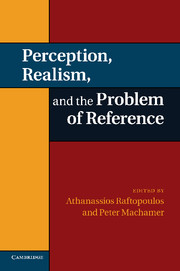Book contents
- Perception, Realism, and the Problem of Reference
- Perception, Realism, and the Problem of Reference
- Copyright page
- Contents
- Figures
- Contributors
- Chapter 1 Reference, perception, and realism
- Chapter 2 Towards an (improved) interdisciplinary investigation of demonstrative reference
- Chapter 3 Visual demonstratives
- Chapter 4 Losing grip on the world: from illusion to sense-data
- Chapter 5 Perceiving the intended model
- Chapter 6 Individuation, reference, and sortal terms
- Chapter 7 Action, perception, and reference
- Chapter 8 Personal and semantic reference
- Chapter 9 Reference from a behaviorist point of view
- Chapter 10 Causal descriptivism and the reference of theoretical terms
- Chapter 11 Scientific representation, denotation, and explanatory power
- Chapter 12 Referring to localized cognitive operations in parts of dynamically active brains
- Index
Chapter 7 - Action, perception, and reference
Published online by Cambridge University Press: 05 May 2012
- Perception, Realism, and the Problem of Reference
- Perception, Realism, and the Problem of Reference
- Copyright page
- Contents
- Figures
- Contributors
- Chapter 1 Reference, perception, and realism
- Chapter 2 Towards an (improved) interdisciplinary investigation of demonstrative reference
- Chapter 3 Visual demonstratives
- Chapter 4 Losing grip on the world: from illusion to sense-data
- Chapter 5 Perceiving the intended model
- Chapter 6 Individuation, reference, and sortal terms
- Chapter 7 Action, perception, and reference
- Chapter 8 Personal and semantic reference
- Chapter 9 Reference from a behaviorist point of view
- Chapter 10 Causal descriptivism and the reference of theoretical terms
- Chapter 11 Scientific representation, denotation, and explanatory power
- Chapter 12 Referring to localized cognitive operations in parts of dynamically active brains
- Index
Summary
- Type
- Chapter
- Information
- Perception, Realism, and the Problem of Reference , pp. 142 - 160Publisher: Cambridge University PressPrint publication year: 2012
- 1
- Cited by

